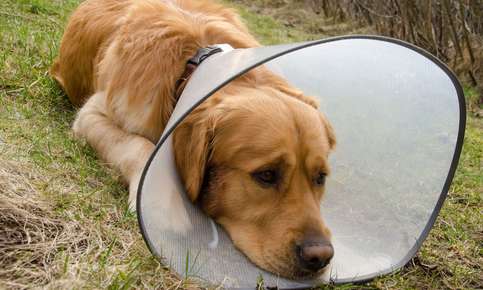
Scratching is the natural reaction when your skin itches, whether you're a person or an animal. Although a few seconds of vigorous scratching may feel good initially, raking your nails over your skin usually only worsens the problem. Unfortunately, dogs and cats don't know when it's time to stop scratching and may soon develop uncomfortable hot spots on their skin.
What Are Hot Spots?
Hot spots are moist, inflamed, infected areas of skin that feel warm to the touch. Formally called moist dermatitis, the spots can affect both dogs and cats but are more common in dogs. Hot spots can form anywhere on the body, but often develop on the chest, head and hips in dogs and on the tail, head, neck or thigh in cats. Because frequent licking or scratching can cause hair loss, red hot spots are usually very noticeable. If the spots aren't treated promptly, they can worsen and increase in size.
What Causes Hot Spots?
Hot spots develop when your dog or cat continually licks, bites or scratches the skin. When the licking or scratching causes a break in the skin, a painful infection develops. Hots spots tend to occur due to:
- Flea Infestations
- Food Allergies
- Environmental Allergies
- Stress
- Joint Pain (Your dog or cat scratches or licks in an attempt to stop the pain.)
- Matted Hair
- Insect Bites
- Contact with Irritating Substances
- Parasites
- Boredom
- Eczema
- A Foreign Object in the Hair or Skin
- Infections of the Ears of Skin
Some dogs, such as rottweilers, German shepherds, St. Bernards, Labrador retrievers and golden retrievers, are more likely to develop hot spots than others.
How are Hot Spots Treated?
Reducing the inflammation and killing the bacteria responsible for the infection are important steps in your pet's hot spot treatment plan. Your pet's veterinarian will trim the hair around the spot to make it easier for you to apply the topical medications that will reduce pain, inflammation and infection. Your pet may also need to take antibiotics for a few weeks and may need corticosteroids to decrease itching and inflammation.
It's important to keep your pet from scratching, licking or biting the hot spot while it heals. If your dog or cat just can't leave the spot alone, he or she may need to wear an Elizabethan collar for a few days.
Although these treatments are very effective in healing hot spots, the condition may occur again unless a cause is determined and changes are made. If your pet suffers from a food allergy, eliminating the foods or ingredients that cause the allergic reaction may be helpful. Environmental allergies can be successful managed with special shampoos, immunotherapy, Omega-3 fatty acids or antihistamines. Steroids are usually only recommended if allergy symptoms are severe and don't respond to other treatments.
Flea and tick preventatives are very helpful if your pet developed a hot spot due to a flea infestation. In addition to treating your pet, it's also important to treat your yard with a flea product, wash bedding and toys, and vacuum your home thoroughly to remove any lingering fleas or eggs.
If your dog or cat has started licking, scratching or biting due to boredom, making a few changes to your furry friend's routine can be helpful. Your dog may benefit by spending more time outdoors with you. In addition to long walks and trips to the dog park, agility training or other activities that keep your pet active and engaged can be beneficial. Cats also benefit from extra play time, particularly if they're the only pet in your home.
Hot spots in older pets may actually be a sign of arthritis or hip dysplasia. Your pet's veterinarian may recommend pain medication and joint supplements to ease your dog or cat's pain and improve mobility. In addition to medications, making a few modifications, such as installing a ramp to your bed if your pet sleeps with you, buying a litter box with low sides and providing a heated resting place during the colder months of the year, can improve your pet's comfort and prevent hot spots.
Treating hot spots promptly will help your pet avoid serious infections. If you notice a sore on your pet's skin, give us a call. We'll arrange a convenient appointment and offer treatment to ease your furry friend's pain and address the underlying cause of the condition.
Sources:
American Kennel Club: Treating and Preventing Hot Spots in Dogs, 10/4/16
http://www.akc.org/content/health/articles/treating-and-preventing-hot-spots-on-dogs/
Healthy Pets: Hot Spots: How to Treat Them and What Do They Mean, 6/4/15
https://healthypets.mercola.com/sites/healthypets/archive/2015/06/04/hot-spot-treatment.aspx
Cesar’s Way: Hot Spots on Dogs: Causes and Treatment
https://www.cesarsway.com/hot-spots-on-dogs-causes-and-treatment/

